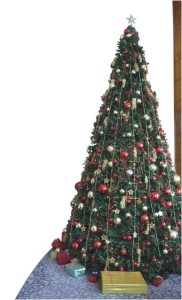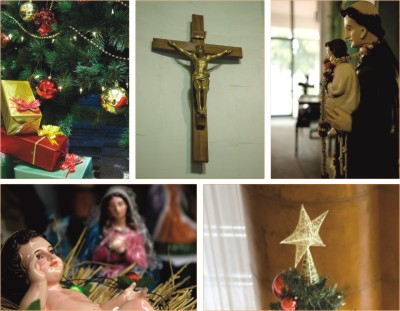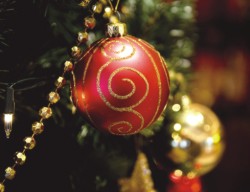 Christmas with the Bose
Christmas with the Bose
The large, decorated tree at the cosy corner of the living room heralded glad tidings of Christmas. The soft, small balls hung from the branches and reflected the colours of the rainbow. Glittered, glossy paper folded into stars and the small, brightly lit bulbs in red, blue and green brought the air of the holiday season right into the home.
“As children, we never decorated trees. The tradition simply had not taken its place in local festivities. It is a foreign influence but now is a big part of Borodin,” says Bose.
Dipok and Snigdha Bose have spent the last 25 Christmases together. Devout Christians, their celebration of Borodin (Christmas) revolves around the church and the spirit of giving.
“The religious aspect of Christmas differs amongst different religious groups across the country, but when it comes to the social facet, every region, every community presents unique features which adds colour to the whole festivities,” said Dipok Bose.
For the last 30 years, Snigdha Bose starts her Christmas attending the service at the AG church at Eskaton. The service begins with rendering devotional songs. The pastor greets the congregation and starts the sermons. The congregation thanks the Lord and reads from the Old Testament and also the New Testament. Prophecies on the coming of the Messiah from the Old Testament are often read out loud on the day Jesus was born.

Prayers form an integral part of the Christmas service. People suffering from maladies or social problems ask the pastor in advance to say prayers on their behalf and the whole congregation takes part.
Pleasantries are exchanged after the end of the service and often, people engage themselves in a feast organised through community participation. “The menu for Christmas is not all that different from what is usually served on any other occasion. The Musims, Hindus and Christians share a basic root and heritage, and this is reflected in almost every aspect of their lives- in times of joy and times of sorrow. Christmas cake has been a recent addition to the Christmas culture; it is a foreign influence. But if we go to pastoral Bengal, we still find the extensive use of a wide assortment of pithas during the celebration of Borodin” said Snigdha Bose.
The young of the family pay their respects to the elders. Just like Eid, salaam is also an integral part of Christmas celebrations. So is the exchange of gifts among the young and old. But both Dipok and Snigdha Bose seem to share an affinity for pastoral celebration of Borodin.
“The religious rites of the day are pretty much the same. In the Catholic church, the mass involves a rigid sequence of rites which lasts for about one hour. The service of the protestant church is much more flexible. In the Garo hills, or the Santal community, the service is conducted in their indigenous language and soon afterward the festivities take a unique aboriginal flavour.
“Christmas in pastoral Bengal begins in early December. Young boys form groups and go from house to house rendering kirtans (devotional songs). Often, the youth engage in a friendly competition while the community act as the judge of their musical prowess. The womenfolk of the household often join the musical bands in singing songs for the Lord. Bengalis are indeed a nation obsessed with feasting. The money collected from singing kirtans are mostly used to arrange a grand dinner where all singers take part.
But above all, Christmas is about sharing and giving. Every year the Bose family shares their Christmas joy, cakes and pithas with the distressed people of the Nirmol Hridoy Home at Tejgaon. Now retired, Snigdha Bose shares her time with the family and in spreading the words of the messiah. Dipok Bose, with a passion for music, now devotes his time conducting choirs and composing music for the church.
The lives of the Bose are not too different from other devout Christians. Their lives are twined in spreading God's word and finding solace through devotion and sharing. Their way is God's way!
By Mannan Mashhur Zarif
Photo: Sazzad Ibne Sayed
Special thanks to Theotonius P. Rozario and Father Porimol Rozario of the Holy Rosary Church, Tejgaon for helping with the photo shoot.
 yuletide reveries
yuletide reveries
“The kids in Girl and Boy Land
will have a jubilee.
They're gonna build a toyland town
all around the Christmas tree.”
J. Fred Coots and Haven Gillespie
Thanks to cable television and popular literature, we're no strangers to the mirth and the merriment that surrounds Christmas. The image of the jolly Santa and his sleigh is a very familiar one to us. And yet, when it boils down to trivia, how much do we know about this much-anticipated Christian festival?
A potpourri of traditions
Christianity arrived in what is now Bangladesh during the late sixteenth to early seventeenth century AD, through the Portuguese traders and missionaries. Although Jesuit priests were active at the Mughal courts in the sixteenth and seventeenth centuries, the first Roman Catholic settlements in what became Bangladesh appear to have been established by the Portuguese, coming from their centre in Goa on the west coast of India. During the sixteenth century the Portuguese settled in the vicinity of Chittagong. In the seventeenth century some Portuguese moved to Dhaka.
Serious Protestant missionary efforts began only in the first half of the nineteenth century. Baptist missionary activities beginning in 1816; the Anglican Oxford Mission, and others worked mainly among the tribal peoples of the Low Hills in the northern part of Mymensingh and Sylhet regions.
Today, the Christian community in Bangladesh numbers at some 450,000 members of the faith, of which 420,000 are Catholics, while the rest are Anglicans. The influences of the Europeans can still be seen in their customs today, with the traditions derived from the different churches and cultures that they had been exposed to, all infused with the predominant Bengali culture to create a flavour that is unique to this region.
Friends, family and fun
So how does a Bangladeshi Christian observe this popular celebration? The St Mary's Cathedral, also informally called the Ramna Church hosts gatherings that last for days, whilst other churches invite the community to join them in decorating the Christmas tree and singing carols. “The Archbishop (Paulinus Costa) presides over the Mass here, but the Tejgaon Holy Rosary Church also enjoys a huge turnout at this time of the year, since Farmgate has one of the largest Christian community,” says Theotonius Gomes, lecturer, Eastern University.
The 'Midnight Mass' actually takes place between 7-8 pm on Christmas Eve, because of security reasons. “This is one time when the confluence of cultures is very visible,” says Neo Mendes of the Enem-Omni Companies. “The churches enjoy a full congregation for the Midnight Mass, and you hear the hymns and prayers that have been offered here through the centuries. Then, once Mass is over and you come out, the celebration begins, with kirtans, and you can feel the influence of the Bengali culture infused into the religious rituals.”
“At home, the presents are laid under a tree, which may be anything from a local jhau tree, to a store-bought plastic tree. There is also a crib, representing the Nativity story; others may have a complete Nativity set on display. Some families complete the exchange of gifts; others just spend time together, singing, eating and generally having a good time.”
The food, as with any major event in this Subcontinent, is an important part of the celebrations. For some households, the Portuguese coconut-based sweet dish dodor takes pride of place; Christmas dinners usually feature a roast of some sort, and cakes. Beef roasts are most popular, while those that can afford it go for an actual turkey with cranberry sauce.
The Mendes household usually opens its doors to friends and families on Christmas Day, with guests coming and going all day. “Many of our non-Christian friends bring their families along to spend time with us and learn about our customs,” he tells us with a smile. “The 'celebrations' are usually very low-key and simple, with the focus being on spending some quality time with the loved ones.”
For the expat Christians living in Dhaka, places like the International Club, and the big hotels usually have special brunch and dinner offers, and there is even a Santa on Christmas Eve, to hand out presents to children.
What is striking about the Christmas celebrations in this country is that for the most part, the spirit remains the same as it had been when it first arrived; the focus is on prayer, spirituality, family and togetherness. With a strong, cohesive feeling and a warm holiday mood settling over the observers, Christmas here has managed to escape the gross commercialization that has invaded the festival in the West.
By Sabrina F Ahmad
Sources: wikipedia.com, http://mysticsaint.blogspot.com
Special thanks to Neo G Mendes.


